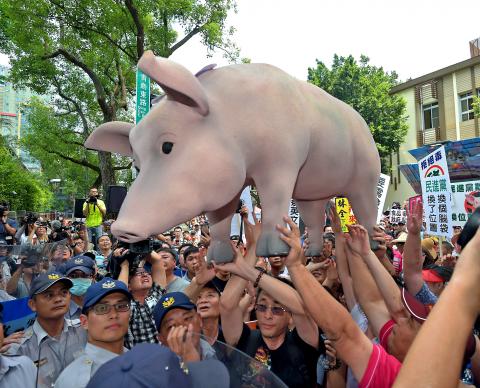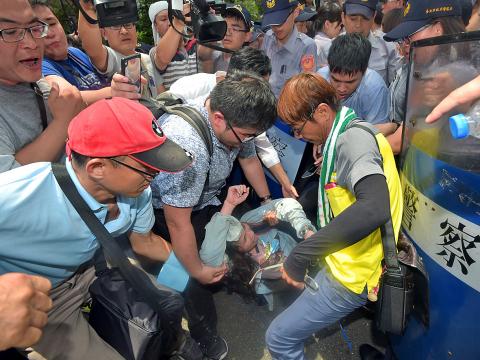Echoing the Chinese Nationalist Party (KMT) caucus’ boycott of the legislature yesterday, hundreds of protesters gathered outside the Legislative Yuan in Taipei to accuse the Democratic Progressive Party (DPP) of flip-flopping on the import of US pork products with ractopamine residue and “bowing down” to Japan on fishermen’s rights, and calling for Premier Lin Chuan’s (林全) resignation.
The crowd tried to break into the Legislative Yuan compound at about 10am and clashed with police at the gate on Qingdao E Road.
The protesters demanded that police open the gate, calling the legislature the “people’s place” and repeatedly citing the Sunflower movement, in which demonstrators broke into and occupied the Legislative Yuan’s main chamber in 2014.

Photo: Huang Yao-cheng, Taipei Times
Politicians on the makeshift stage set up by the KMT, including KMT Tainan City Councilor Hsieh Lung-chieh (謝龍介) and Taipei City Councilor Wang Hung-wei (王鴻薇), asked the police to stop being “the autocrat’s bullyboys” and, appealing for police support, said Lin’s dropping of charges against the Sunflower protesters hurt frontline law enforcement officers.
At least three KMT lawmakers left the main chamber and went to greet the crowd and, at the other side of the gate, demanded that police open the gate to allow the lawmakers to enter.
The scuffling and pushing continued until the police slid the gate open slightly to allow the lawmakers to slip through and quickly closed it again.

Photo: Huang Yao-cheng, Taipei Times
The crowd also passed a large pink polystyrene pig over the gate and into the compound, which was then taken by KMT Legislator Chen Chao-ming (陳超明) to the chamber and placed on the front lectern.
DPP lawmakers joked that the model represented US pigs because local pigs are black.
The protesters, reduced in number, but continuing to demonstrate outside the Qingdao E Road gate, initiated another round of pushing at about 11am, during which KMT Legislator Huang Chao-shun (黃昭順) called, along with the crowd, for the “removal of the blockades” —while the police responded: “There is no blockade” — and argued with the police to allow some of the protesters to sit in on the legislative floor meeting as visitors.
Mao Chia-ching (毛嘉慶), one of KMT Chairwoman Hung Hsiu-chu’s (洪秀柱) closest aides and now the KMT’s Culture and Communications Committee deputy director, said on the stage that the DPP would give up the nation’s sovereignty once the “rights concerning the pigs” and fishermen’s rights are conceded.
“Who else but we are to protect the Republic of China?” Mao said.
“Do you think we are here protesting to gain political benefits, like the DPP did?” Mao said.
The protest was reported to have been masterminded by KMT headquarters and closely supported by the caucus.
Local media on Monday night reported that the KMT wished to emulate the “Sunflower movement model” with a siege of the Legislative Yuan and a simple stage to allow legislators to take turns to deliver short talks to the crowd.
An anonymous KMT lawmaker told the Chinese-language NOWnews Web site on Monday night that the KMT would not “protest for no reason,” which would go against the “KMT style,” adding that the complaint had “the strong support of public opinion.”
The crowd began dispersing at about 11:40am and was gone by about 12pm.
There was a rumor Hung would greet the gathering, but she was not seen by the end of the rally.
New Power Party Legislator Hsu Yung-ming (徐永明) wrote on Facebook that former KMT legislator Wu Yu-sheng (吳育昇), during the protest, mocked President Tsai Ing-wen’s (蔡英文) unmarried status with a pun on the Chinese word for “women marrying” (chu-ge, 出閣) and for “a no-confidence vote against the Cabinet” (dao-ge, 倒閣).
“The KMT should have focused on the issues that they found unacceptable when they brought the people to the street, who toiled to follow the party [to the rally] and tried to obtain public support, rather than making personal attacks,” Hsu said, calling Wu’s remarks “a fake protest, but discrimination in essence.”

TRAGEDY STRIKES TAIPEI: The suspect died after falling off a building after he threw smoke grenades into Taipei Main Station and went on a killing spree in Zhongshan A 27-year-old suspect allegedly threw smoke grenades in Taipei Main Station and then proceeded to Zhongshan MRT Station in a random killing spree that resulted in the death of the suspect and two other civilians, and seven injured, including one in critical condition, as of press time last night. The suspect, identified as a man surnamed Chang Wen (張文), allegedly began the attack at Taipei Main Station, the Taipei Fire Department said, adding that it received a report at 5:24pm that smoke grenades had been thrown in the station. One man in his 50s was rushed to hospital after a cardiac arrest

SAFETY FIRST: Double the number of police were deployed at the Taipei Marathon, while other cities released plans to bolster public event safety Authorities across Taiwan have stepped up security measures ahead of Christmas and New Year events, following a knife and smoke bomb attack in Taipei on Friday that left four people dead and 11 injured. In a bid to prevent potential copycat incidents, police deployments have been expanded for large gatherings, transport hubs, and other crowded public spaces, according to official statements from police and city authorities. Taipei Mayor Chiang Wan-an (蔣萬安) said the city has “comprehensively raised security readiness” in crowded areas, increased police deployments with armed officers, and intensified patrols during weekends and nighttime hours. For large-scale events, security checkpoints and explosives

A car bomb killed a senior Russian general in southern Moscow yesterday morning, the latest high-profile army figure to be blown up in a blast that came just hours after Russian and Ukrainian delegates held separate talks in Miami on a plan to end the war. Kyiv has not commented on the incident, but Russian investigators said they were probing whether the blast was “linked” to “Ukrainian special forces.” The attack was similar to other assassinations of generals and pro-war figures that have either been claimed, or are widely believed to have been orchestrated, by Ukraine. Russian Lieutenant General Fanil Sarvarov, 56, head

PUBLIC SAFETY: The premier said that security would be tightened in transport hubs, while President Lai commended the public for their bravery The government is to deploy more police, including rapid response units, in crowded public areas to ensure a swift response to any threats, President William Lai (賴清德) said yesterday after a knife attack killed three people and injured 11 in Taipei the previous day. Lai made the remarks following a briefing by the National Police Agency on the progress of the investigation, saying that the attack underscored the importance of cooperation in public security between the central and local governments. The attack unfolded in the early evening on Friday around Taipei Main Station’s M7 exit and later near the Taipei MRT’s Zhongshan